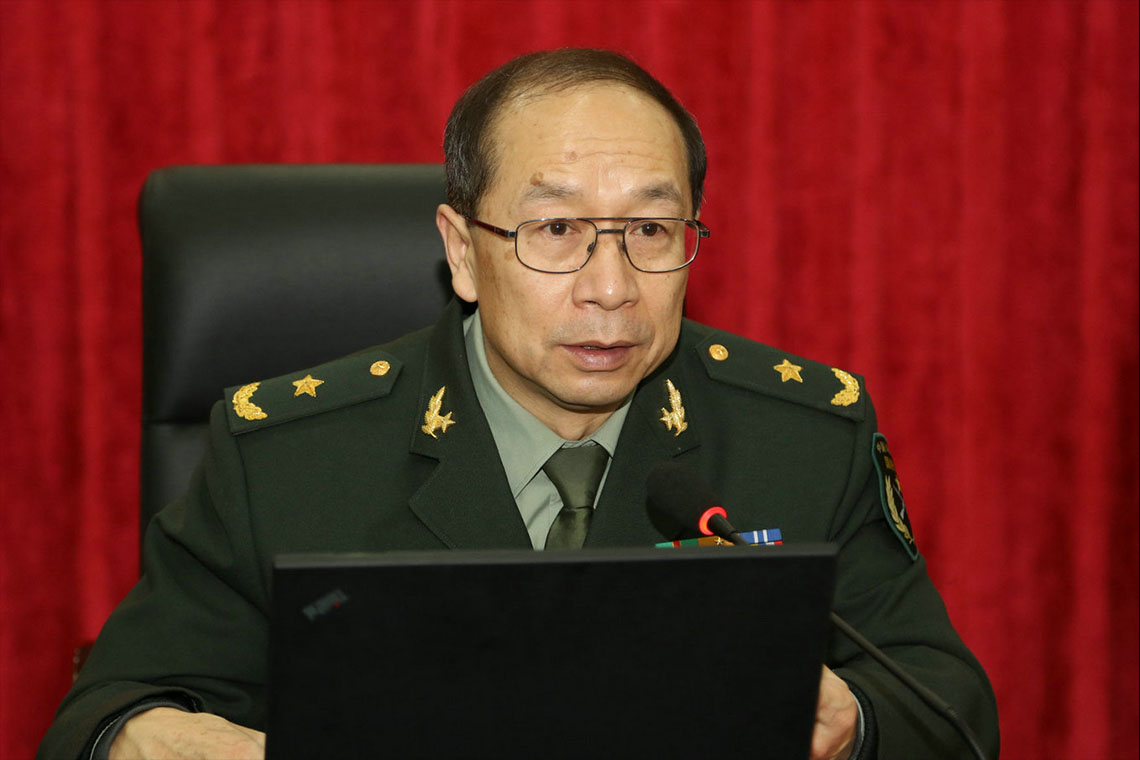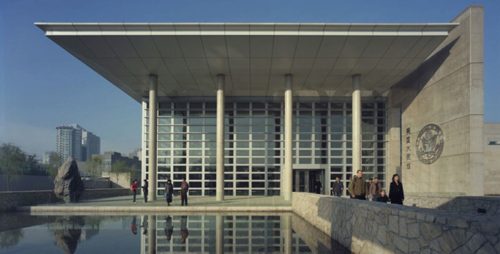News roundup: Don’t meet Trump until ‘his head is covered with bumps’ — PLA adviser
Top China news for March 2, 2017. Get this daily digest delivered to your inbox by signing up at supchina.com/subscribe.

Chinese military adviser sees Trump as a gift to China
Jin Yinan 金一南 is a retired People’s Liberation Army (PLA) general and former professor at the PLA’s National Defense University who still has some kind of advisory role with the Chinese military establishment. He is known for his hawkish opinions: Last year, he accused Singapore of siding with the U.S. in tensions over the South China Sea and said the city-state should “pay the price for seriously damaging China’s interests.” In the last week, a video (in Chinese) of a speech he made on how China should deal with Donald Trump has circulated widely in China and abroad. Chinascope has translated an excerpt from the speech.
Jin says that Trump’s “biggest opponent is not China, but the elite groups in his own country,” and that the Chinese “do not need to lift a finger” as Americans attack Trump and the U.S. retreats globally, allowing China to fill the vacuum. He believes that Trump’s withdrawal from the Trans-Pacific Partnership (TPP) is “a wonderful gift” to China. Jin also urges Xi Jinping not to rush to meet the American president, stating, “Some diplomats urged that President Xi should meet with Trump as soon as possible to stabilize the Sino-U.S. relationship. I say this was wrong. Why meet him as soon as possible? Let Trump continue his rampage. We can meet him when his head is covered with bumps.”
Today on The China Project
Today, we publish a Sinica Podcast episode with Pulitzer Prize winner and New York Times Beijing bureau chief Jane Perlez on Chinese foreign relations in our age of uncertainty.
Xi Jinping: Two terms and Two Sessions
The South China Morning Post has a useful explainer on the annual political gathering known as the “Two Sessions” (两会 liǎnghuì), which begins tomorrow in Beijing. Much of the unofficial commentary on the Two Sessions includes speculation on whether Xi Jinping will use the meetings to extend his grip on power, or signal his intent to do so. In The New York Times, Chris Buckley writes that Xi’s “immediate goal appears to be opening the way to keeping on Wang Qishan, who has led his signature anticorruption drive.” Wang is 68 and would be forced to step down if the retirement conventions of the last three decades are kept in place. If Wang does retain a senior leadership role, there would be a precedent for Xi to stay in power after his two terms as president end in 2023.
This type of speculation is absent from Chinese state media. However, the fact that Xi is large and in charge is conspicuous. One Xinhua article titled “China’s Two Sessions to highlight Xi’s thoughts” quotes unnamed officials who say that “safeguarding Xi’s core status is ‘a political issue of the utmost importance.’”
All the wine in China
The Drinks Business reports that China will become the world’s second-largest wine market by 2020, with sales reaching $21 billion according to data from the wine and spirits conference Vinexpo. China is currently ranked fourth behind the United States, Britain, and France. The U.S. will remain the world’s largest wine market, with sales in 2020 forecast to be $38 billion.
—Jeremy Goldkorn, Editor in Chief
This issue of the The China Project newsletter was produced by Sky Canaves, Lucas Niewenhuis, Jia Guo, and Jiayun Feng. More China stories worth your time are curated below, with the most important ones at the top of each section.
BUSINESS AND TECHNOLOGY:
- Tesla’s China sales triple to more than $1 billion / Bloomberg
The electric-car maker Tesla tripled its revenue in China to more than $1 billion last year, indicating that the country could become the company’s biggest market. While sales from the U.S. doubled to more than $4.2 billion last year, China accounted for more than 15 percent of Tesla’s more than $7 billion of total revenue, according to a U.S. regulatory filing. When the company first entered China in 2014, it faced many obstacles such as the lack of charging stations and slow deliveries. Tesla later introduced converters that allow owners to power their vehicles at state-run charging points.
Tesla is unquestionably a premium brand in China, but as in the U.S., there are plenty of critics. On the Chinese social media platform Weibo, some people question whether the company can produce cars that are absolutely “pollution free” while others express concerns (in Chinese) over the lifespan of Tesla batteries. Tesla also faces a formidable array of competitors that make electric cars in China.
- He traveled the world on frequent flyer miles, now his app helps others do it / Tech in Asia
- Opinion: China’s private companies are unjustly labeled as Communist Party plants / The Conversation
- China property giant Wanda partners with UnionPay to expand mobile payment scheme / SCMP
- Can the head of China’s stock market watchdog hunt down crocodiles? / SCMP
POLITICS AND CURRENT AFFAIRS:
- Bloody Islamic State video puts China in cross hairs / SCMP
On Monday, thousands of troops paraded through the streets of Urumqi, the capital of the violence-stricken Xinjiang Uyghur Autonomous Region. On the same day, SITE Intelligence Group, a company that tracks jihadi media, released a video (paywall) apparently sourced from an Islamic State group in western Iraq that shows Uyghur fighters and their children in the battlefield and training camps, and “brutally executing informants.” The South China Morning Post quotes one of the Uyghurs in the video: “Oh, you Chinese… We are the soldiers of the Caliphate, and we will come to you to clarify to you with the tongues of our weapons, to shed blood like rivers and avenge the oppressed.” In response, a Chinese foreign ministry spokesperson said that China “proactively participates in international cooperation to crack down on terrorism.” A People’s Daily report on the matter quotes an academic who denounces “the double standard of Western media on the security in Xinjiang.”
- How Liu He went from government researcher to Xi’s right-hand man / SCMP
- Xi Jinping appoints new man to tackle PLA corruption / SCMP
- China drills again near Taiwan as island warns of threat / Reuters
- China values South China Sea navigation freedom more than anyone: spokesperson / Xinhua
- China’s new cruise ship starts maiden Xisha voyage – South China Sea tourism / Xinhua
SOCIETY AND CULTURE:
- China blocks Korean entertainment on streaming platforms over THAAD row / Billboard
China has reportedly blocked access to the latest South Korea music and dramas on the country’s online video-sharing platforms. The move is widely seen as part of China’s retaliatory actions against South Korea, which plans to install a THAAD (Terminal High Altitude Area Defense) missile defense system near Seoul. In January, concerts by South Korean soprano Sumi Jo, which were to take place in Beijing, Shanghai, and Guangzhou in February, were canceled. On Tuesday, a China foreign ministry spokesperson was asked if the block on video platforms was in retaliation for the THAAD installation. His reply (in Chinese): “China always has a clear and consistent position on THAAD. In response to the specific circumstances you mentioned, I personally don’t watch South Korean drama or entertainment. I can’t answer.” Chinese social media erupted with various reactions. Some netizens welcomed the decision, with one comment reading, “National interests first. I voluntarily boycott South Korean entertainment.” Others, however, questioned “why the public should be denied entertainment access because of a political crisis.”
- Following the elections in the West – Chinese reactions on Wilders and “the rise of the right” / What’s on Weibo
- Big in China: Movies that earn more RMB than US$ / China Film Insider
- A Chinese period drama named its bad guys after today’s ruling elite — and the censors missed it / Quartz
- The subtle brilliance of ‘Mr. Donkey’ – the success of a darkly comic film / LARB Blog
- 10 White Houses, 4 Arcs de Triomphe, 2 Sphinxes…now China’s Tower Bridge attracts scorn – replica architecture / NYT (paywall)





